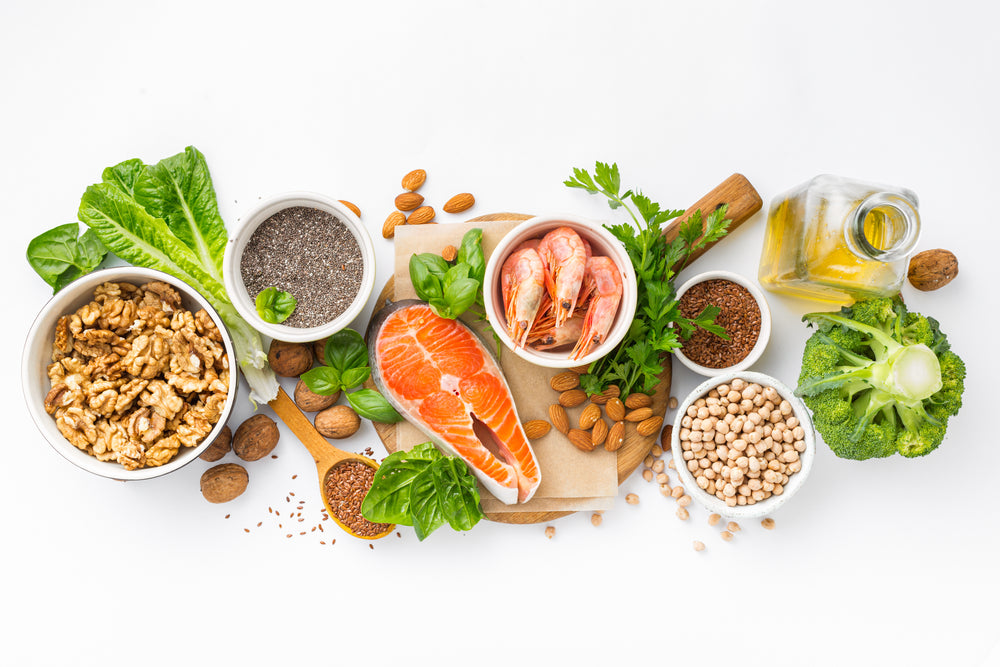
How To Boost Your Brain With Omegas

How To Boost Your Brain With Omegas
How To Boost Your Brain With Omegas
You’ve probably heard of omega-3 fatty acids, in fact it is one of the most commonly taken supplements, mainly because the typical “Western” diet leaves us severely lacking in this department. What you may not have heard is that omega-3 isn’t just fantastic for heart health and glowing skin, it’s a major player in brain health.
What are omega-3 fatty acids?
When we talk about omega-3 we are generally referring to the main poly-unsaturated fatty acids, alpha-linolenic acid (ALA), eicosapentaenoic acid (EPA), and docosahexaenoic acid (DHA). ALA is the most common omega-3 fatty acid, found in many foods we eat regularly, and is considered an essential nutrient as we can’t make it in the body ourselves. However, ALA is not the most useful to us, instead DHA is the most influential of the fatty acids, by being a key component of the retina, brain and sperm. Once in our body, ALA can be converted to EPA and DHA, however the conversion rate is very poor, sitting at around 10%. Therefore the most practical way to increase these fatty acids in the body is by consuming EPA and DHA in the diet or supplement programme.
How do they help us?
Countries where omega-3 rich foods are consumed regularly, such as Japan and Greenland, experience significantly lower rates of cardiovascular disease than the UK. This is one of the major reasons increased omega-3 and oily fish intake is so regularly recommended, however omega-3 fatty acids also help to support:
- Joint health, pain and inflammation
- Pregnancy
- Child health
- Eye health
- Gut microbiome
- Cognitive function
- Mental health
Omega-3 for the brain
Consisting of nearly 60% fat, DHA makes up almost half of that, therefore the brain clearly needs a healthy regular intake of omega-3 fatty acids to function optimally. The brain is a clever organ and in cases where we don’t consume enough omega-3 the brain will improvise and attempt to make do with what it’s got, however output will be less than desirable. In the long-term this may lead to difficulties with learning, poor memory, advanced brain aging and smaller brain size - not an ideal outcome for any age. Omega-3 intake is particularly important during pregnancy while the brain is being formed and growing, as observational studies have shown that below optimal consumption of oily fish during pregnancy was associated with slower cognitive development, communication skills and lower IQ in infants.
Within the brain omega-3 plays a number of roles:
- Preserving cell membrane integrity
- Aids communication between neurons
- Encourages synthesis and actions of neurotransmitters
- Manages blood flow through the brain
- Supports brain tissue growth and development
- Protects the brain against oxidative stress
- Assists cognition and memory function
- May reduce risk of neurodegenerative diseases, such as Alzheimer’s disease
- May reduce mood disorders, such as depression and anxiety
- Managing inflammation in the brain.
How much omega-3 do we need?
There is no minimum daily requirement in government recommendations, however we should aim to get 450mg of EPA and DHA daily. This can be achieved through two servings of fish per week, one of which being oily. When increasing your intake of omega-3, it can take anywhere between 6 weeks and 6 months to notice a difference in symptoms such as mood and memory function. Recommended intake is higher during pregnancy and lactation, largely to support healthy brain development, however no more than 2 portions of oily fish should be consumed per week during pregnancy due to the vitamin A content.
Top tips for supplementation
Supplements, usually in liquid or capsule form, are mostly made using fish oil, krill oil or cod liver oil, however the fatty acids are originally created by microalgae, which is then consumed by phytoplankton which the fish eat. Therefore vegan/vegetarian supplements are able to cut out the middle-fish and go straight to the source, extracting and encasing omega-3 from algae. There are a broad range of supplements to choose from, and if you are considering a supplement, you should know:
- Some supplements contain a reasonable vitamin D and vitamin A content too, which is beneficial for many though may not be suitable during pregnancy and lactation.
- Always check the labels to ensure they contain a good EPA and DHA ratio, particularly with vegan and plant-based alternatives.
- Your supplement should contain around 450mg per daily dose, this equates to eating two portions of fish per week.
- Children will require a lower daily intake than adults, choose an age-appropriate supplement.
- Seek support from a nutritionist or dietician if in doubt.
Food sources
Just as with supplements, there are both plant-based and fish-based food sources of omega-3 fatty acids, however while ALA can be found in plant-based foods, such as flaxseed, pumpkin seeds and walnuts, the more powerful DHA and EPA are present in various types of fish, particularly the oily kind.
|
Food |
ALA* |
EPA* |
DHA* |
|
Plant-based |
|||
|
Flaxseed (1 tbsp) |
7.26 |
- |
- |
|
Chia seeds (1 tbsp) |
5.06 |
- |
- |
|
Walnuts |
2.57 |
- |
- |
|
Soybean |
0.26 |
- |
- |
|
Fish-based |
|||
|
Salmon (farmed) |
- |
0.59 |
1.24 |
|
Salmon (wild) |
- |
0.35 |
1.22 |
|
Herring |
- |
0.77 |
0.94 |
|
Sardines |
- |
0.45 |
0.74 |
|
Mackerel |
- |
0.43 |
0.59 |
|
Trout |
- |
0.40 |
0.44 |
*grams per serving
Plant-based vs Fish
From a sustainability point vegan supplements and food sources would come out on top, however if you are looking to increase your intake of DHA then these may not suffice and the next best choice is focusing on smaller fish. These fish, such as mackerel and sardines, are able to grow in population rapidly, meaning they are less susceptible to overfishing.





